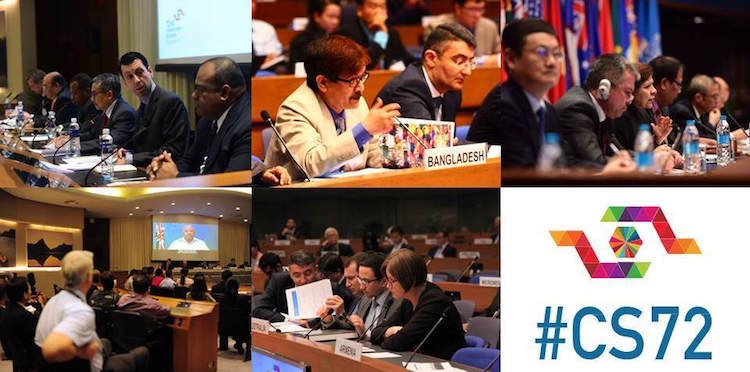Analysis by Kalinga Seneviratne
BANGKOK (IDN) – The major United Nations agency overseeing development in the Asia-Pacific region has called for a major rethink in the development paradigm for the region.
In an ‘Economic and Social Survey’ of the region presented to its 72nd sessions here from May 17 to 19, the Economic and Social Commission for Asia and the Pacific (ESCAP) says that while the centre of global economic gravity continues to move eastwards, the time has come for the Asia-Pacific region to adopt a development model that relies more on domestic and regional demand.
Arguing that it is futile to continue the exclusive reliance on export-led development, ESCAP is also calling for more rural agriculture and industrial development, with better rural-urban connectivity via transport and communication links.
“These challenges can be partially met through enhanced domestic resource mobilisation, given the exceptional tax potential of the region. Unlocking this potential will require countries to abolish tax holidays and exemptions that are distorting investment regimes,” ESCAP’s Executive Secretary Dr Shamshad Akther said in an opening address.
“Progressivity of taxation systems will help to tackle inequalities and direct flows to more sustainable investments,” she argued, pointing out that the region has good potential “to strengthen enabling environments to tap capital for sustainability” because it holds global liquidity close to 100 trillion dollars and sovereign wealth funds worth about 3 trillion dollars.
The economic outlook for Asia-Pacific is broadly stable, argues the report, predicting a growth estimated at 4.6 percent last year to increase marginally to 5 percent in 2017.
With the prospect for export-led growth uncertain due to economic woes in Europe and Japan as well as the United States, it is a shift in development strategy towards increasing domestic demand and productivity that will drive the regional economies of the future, says ESCAP.
“One of the fundamental issues we are raising in our survey is low wages,” Hamza Ali Malik, Chief of ESCAP’s Macroeconomic Policy and Analysis Section, told IDN-INPS in an interview. “If the region is to have sustainable development, it has to enhance productivity (and) you need a high level of productivity to support a high level of real wages.”
In a high-level discussion at the sessions here, there was broad agreement that monetary policy has failed and that fiscal policy now needs to be given more prominence, with governments using increased tax revenue to stimulate economic growth by investing in health, education and infrastructure development that would enhance productivity in the long term.
Dr Supachai Panitchipakdi, former head of the Geneva-based UNCTAD, said that monetary policies are now dysfunctional and, with global trade on the decline in recent years, Asia will need to escape the low-labour cost, export-oriented development model. UNCTAD is UN agency dealing with development issues, particularly international trade – the main driver of development.
“We tend to ignore the income policy side which has been highlighted in this ESCAP report,” noted Dr Supachai. “(Along with an increase in productivity) we need to look at income policy as a whole … when we talk of productivity increase we need to look at how to transform that to income increase. Many countries have been successful in increasing their productivity levels, but income levels has stayed behind.” This, it was argued, creates asset bubbles not increased domestic consumption.
Teuea Toatu, Minister of Finance and Economic Development of Kiribati, noted that productivity-driven economic growth is possible and his small isolated Pacific Island country has been able to demonstrate that it is not a “hopeless dream”.
He explained that Kiribati government has realised that the knowledge and skill level of its small labour force needed to be improved and it has thus invested in education as well as health services. It has also doubled the price of copra that the government purchases from rural farmers for export.
“Rural economy must be developed through inclusive policies,” argued Toatu. “Subsidies for the purchase of copra help to increase production and keep the rural farmers on their land rather than migrating to the city.”
According to Thailand’s Permanent Secretary of Foreign Affairs, Vitavas Srivihok, increasing digital literacy, especially of students in isolated rural schools, is an important government policy to educate the population for future productivity growth. He explained that the Thai king’s ‘Sufficiency Economy’ model being introduced to rural areas is based on “working with local communities to build strength and resilience from within”.
“In South Asia, most farmers are small farmers (and) raising their productivity is a big challenge,” Arjun Bahadur Thapa, Secretary-General of the South Asian Association for Regional Cooperation (SAARC) told the meeting. “We need to educate and equip small farmers with technology to increase production.”
Taking the cue from Africa and Latin America, SAARC is encouraging the use of ‘farm radio’ to educate farmers because it is a cheap avenue of educating them, he added, while pointing out that most training institutes are located in urban areas.
For Malik, the Sustainable Development Goals for 2030 that the UN system is promoting are about taking a holistic approach to development. “Rather than saying let’s grow (economically) first and then deal with social or environment issues, what we are saying now is, no, let’s look at the trade-offs in all three issues at the same time,” he pointed out. “That’s a paradigm shift in the way you think of development.”
“It’s a move away from focusing only on the economic growth or production aspect, and saying that human welfare is much more important than economic growth,” argued Malik. “Yes, it (economic growth) is important but it’s not the whole story. That is what the whole UN system is now pursuing.” [IDN-InDepthNews – 19 May 2016]
IDN is flagship agency of the International Press Syndicate.
Image source: ESCAP
2016 IDN-InDepthNews | Analysis That Matters|
Send your comment | Subscribe to IDN newsletter
Follow us on Twitter and Facebook:
http://twitter.com/InDepthNews
http://www.facebook.com/IDN.GoingDeeper

